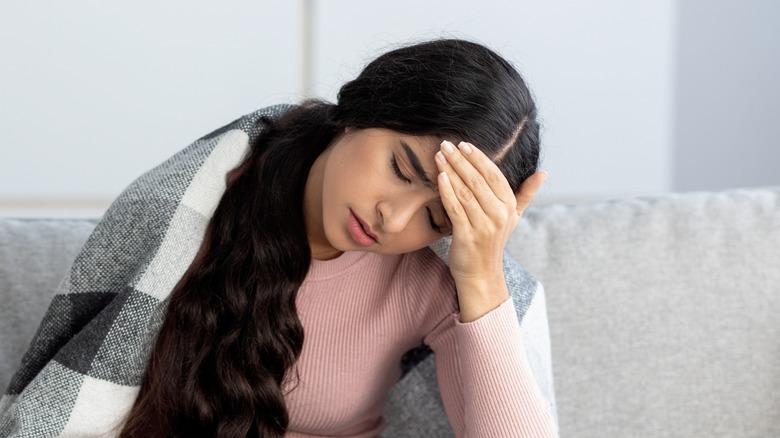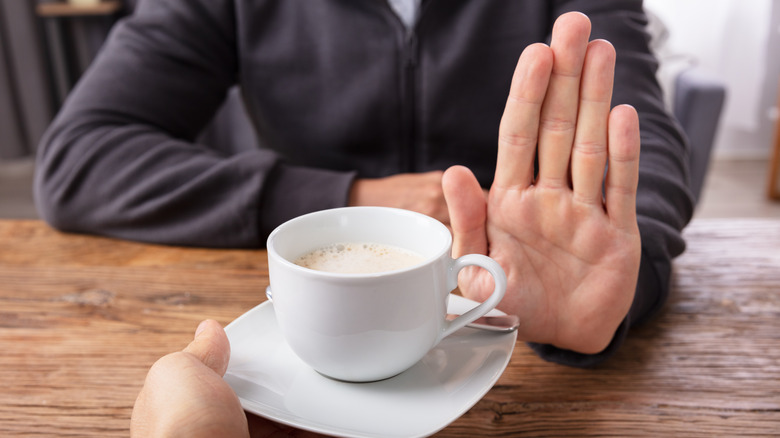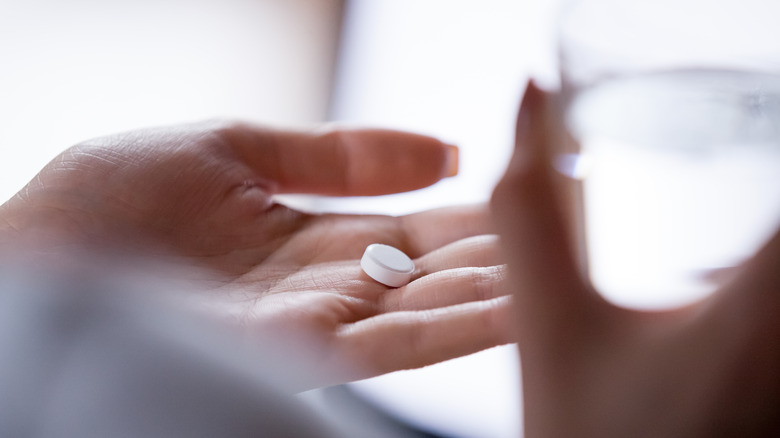Fasting Headache Pain: Prevention Tips And How To Get Relief
Whether you're fasting for a religious service or a specific diet, it's not uncommon for you to get a headache. In fact, StatPearls says more than half of people who skip meals can experience fasting headaches. During the holy month of Ramadan, Muslims are three times more likely to suffer from migraine than in other months, according to a 2010 article in The Journal of Headache and Pain. A 1995 study in Neurology found that almost 40% of people who fasted for Yom Kippur had fasting headaches, and these headaches weren't related to caffeine withdrawal, nicotine withdrawal, or oversleeping.
You'll typically feel a headache within 16 hours after you begin fasting, and it will appear in the front of your forehead, according to a 2010 review in Current Pain and Headache Reports. This type of headache is the way your body tells you something's out of balance, such as your blood sugar, according to the National Headache Foundation.
Obviously, a remedy for fasting headache pain is to eat a meal, but that might not be possible for people who are fasting for a specific purpose, such as a diet or a religious observance. However, in these cases, there are ways to prevent them and get relief.
Preventing a fasting headache
The Headache Clinic says some fasting headaches are caused by caffeine withdrawal. If you know that you will be fasting for a length of time, you could take several weeks to wean yourself off caffeine so your headache pain isn't as severe. If your fast is much shorter, such as a day, a strong cup of coffee before the fast could help.
Some fasting headaches are triggered by hypoglycemia, or low blood sugar. If your typical diet is high in sugar and you start a fast, this quick drop in glucose levels could cause that nagging pain in your forehead. Before starting a fast, choose carbohydrates that are low on the glycemic index, such as green vegetables, kidney beans, chickpeas, and lentils.
The Headache Clinic also says that fasting headaches can be caused by dehydration. Because many of the foods you enjoy (aside from nuts, crackers, baked goods, and cereals) have a good amount of water in them, you could easily become dehydrated when you suddenly stop eating. As a protective response, your brain will begin producing histamines to conserve the amount of water in the brain. These histamines could result in a fasting headache, so be sure to drink water before and during your fast to avoid dehydration.
Relieving pain from a fasting headache
If you feel a fasting headache coming on, you can try taking naproxen sodium (sold under brand names such as Aleve) for relief, according to The Headache Clinic. It's also halal, so it's ok to take this OTC medicine before your Ramadan fast. Homage suggests applying lavender or peppermint essential oils to your temples or adding them to an oil diffuser for headache relief. A head massage or a cold compress might also soothe a fasting headache. You'll also want to keep drinking plenty of water to ensure your body's fluid levels are back in proper balance.
If you don't get a headache until after your fast is over, you might want to consider whether it's due to the food itself rather fasting. Some foods might trigger a headache, such as aged cheeses, foods with monosodium glutamate (MSG), dried meats and fruits, foods with high sugar, and processed foods such as hot dogs or packaged cookies (via Cleveland Clinic). Instead, look for raw fruits and vegetables, whole grains, nuts, and seeds. If you eat meat or fish, stay away from anything cured, smoked, or dried.
If you don't find relief after eating or using any of the above treatments, it's best to see a doctor to ensure your headache isn't a sign of something more serious.



